Criticism of International Criminal Court
VerifiedAdded on 2023/01/19
|9
|2609
|88
AI Summary
This essay discusses the criticisms faced by the International Criminal Court for not being able to fulfill its mandates. It explores the challenges and limitations of the court in maintaining global justice and sovereignty. The essay also highlights the lack of accessibility for victims and the dualistic nature of the court system.
Contribute Materials
Your contribution can guide someone’s learning journey. Share your
documents today.
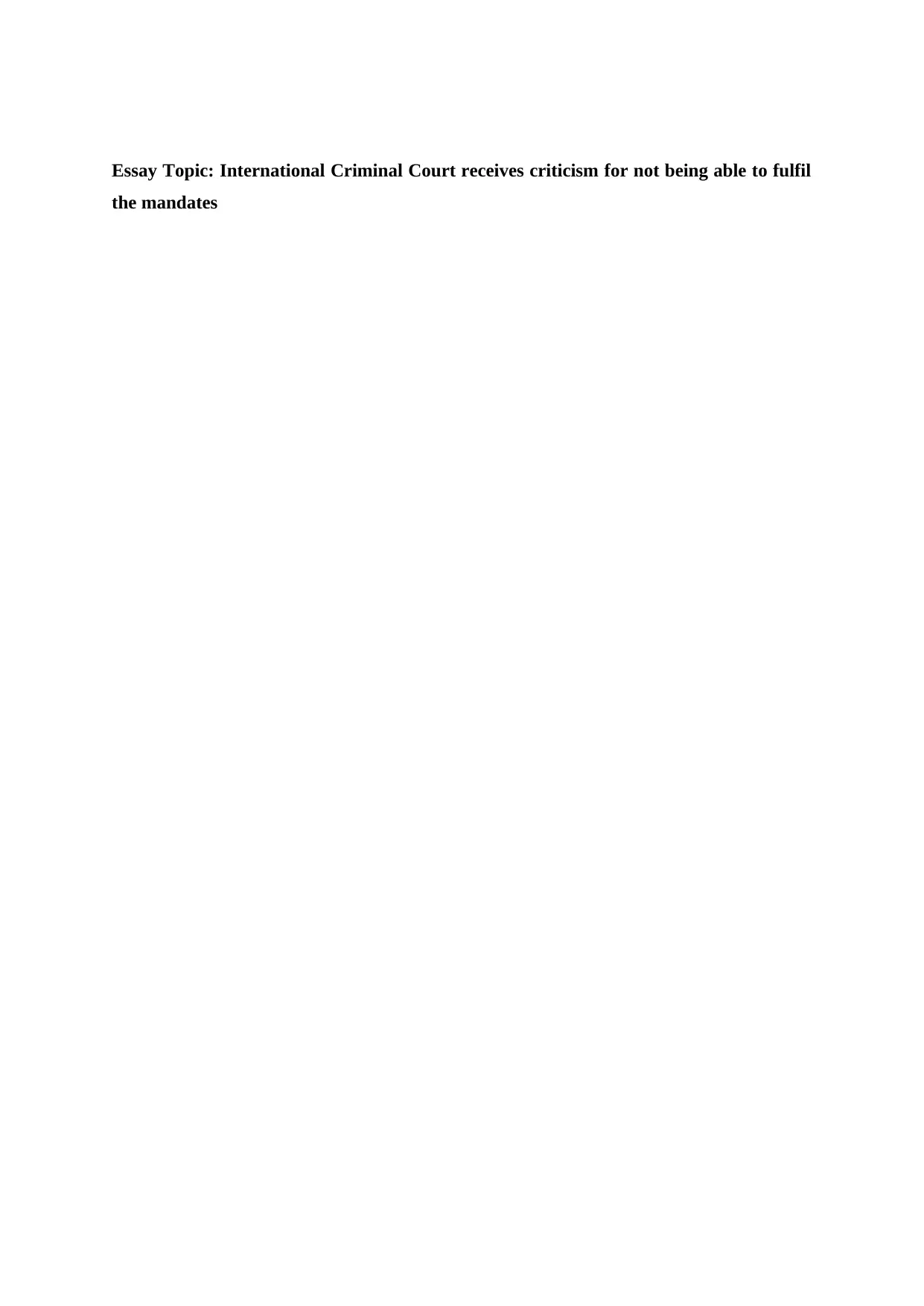
Essay Topic: International Criminal Court receives criticism for not being able to fulfil
the mandates
the mandates
Secure Best Marks with AI Grader
Need help grading? Try our AI Grader for instant feedback on your assignments.

Table of Contents
Introduction................................................................................................................................3
Main Body..................................................................................................................................3
Conclusion..................................................................................................................................3
Reference....................................................................................................................................3
Introduction................................................................................................................................3
Main Body..................................................................................................................................3
Conclusion..................................................................................................................................3
Reference....................................................................................................................................3
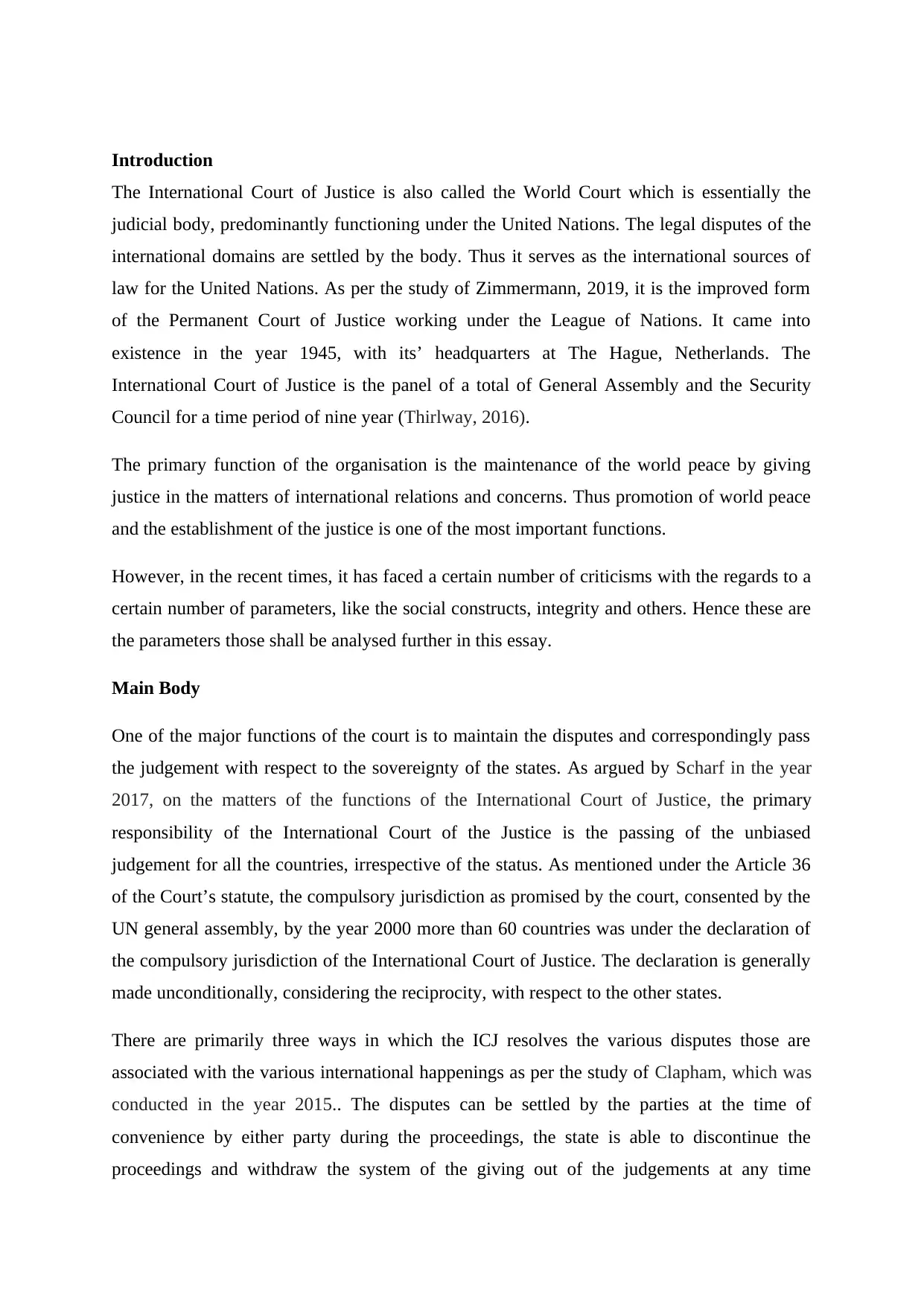
Introduction
The International Court of Justice is also called the World Court which is essentially the
judicial body, predominantly functioning under the United Nations. The legal disputes of the
international domains are settled by the body. Thus it serves as the international sources of
law for the United Nations. As per the study of Zimmermann, 2019, it is the improved form
of the Permanent Court of Justice working under the League of Nations. It came into
existence in the year 1945, with its’ headquarters at The Hague, Netherlands. The
International Court of Justice is the panel of a total of General Assembly and the Security
Council for a time period of nine year (Thirlway, 2016).
The primary function of the organisation is the maintenance of the world peace by giving
justice in the matters of international relations and concerns. Thus promotion of world peace
and the establishment of the justice is one of the most important functions.
However, in the recent times, it has faced a certain number of criticisms with the regards to a
certain number of parameters, like the social constructs, integrity and others. Hence these are
the parameters those shall be analysed further in this essay.
Main Body
One of the major functions of the court is to maintain the disputes and correspondingly pass
the judgement with respect to the sovereignty of the states. As argued by Scharf in the year
2017, on the matters of the functions of the International Court of Justice, the primary
responsibility of the International Court of the Justice is the passing of the unbiased
judgement for all the countries, irrespective of the status. As mentioned under the Article 36
of the Court’s statute, the compulsory jurisdiction as promised by the court, consented by the
UN general assembly, by the year 2000 more than 60 countries was under the declaration of
the compulsory jurisdiction of the International Court of Justice. The declaration is generally
made unconditionally, considering the reciprocity, with respect to the other states.
There are primarily three ways in which the ICJ resolves the various disputes those are
associated with the various international happenings as per the study of Clapham, which was
conducted in the year 2015.. The disputes can be settled by the parties at the time of
convenience by either party during the proceedings, the state is able to discontinue the
proceedings and withdraw the system of the giving out of the judgements at any time
The International Court of Justice is also called the World Court which is essentially the
judicial body, predominantly functioning under the United Nations. The legal disputes of the
international domains are settled by the body. Thus it serves as the international sources of
law for the United Nations. As per the study of Zimmermann, 2019, it is the improved form
of the Permanent Court of Justice working under the League of Nations. It came into
existence in the year 1945, with its’ headquarters at The Hague, Netherlands. The
International Court of Justice is the panel of a total of General Assembly and the Security
Council for a time period of nine year (Thirlway, 2016).
The primary function of the organisation is the maintenance of the world peace by giving
justice in the matters of international relations and concerns. Thus promotion of world peace
and the establishment of the justice is one of the most important functions.
However, in the recent times, it has faced a certain number of criticisms with the regards to a
certain number of parameters, like the social constructs, integrity and others. Hence these are
the parameters those shall be analysed further in this essay.
Main Body
One of the major functions of the court is to maintain the disputes and correspondingly pass
the judgement with respect to the sovereignty of the states. As argued by Scharf in the year
2017, on the matters of the functions of the International Court of Justice, the primary
responsibility of the International Court of the Justice is the passing of the unbiased
judgement for all the countries, irrespective of the status. As mentioned under the Article 36
of the Court’s statute, the compulsory jurisdiction as promised by the court, consented by the
UN general assembly, by the year 2000 more than 60 countries was under the declaration of
the compulsory jurisdiction of the International Court of Justice. The declaration is generally
made unconditionally, considering the reciprocity, with respect to the other states.
There are primarily three ways in which the ICJ resolves the various disputes those are
associated with the various international happenings as per the study of Clapham, which was
conducted in the year 2015.. The disputes can be settled by the parties at the time of
convenience by either party during the proceedings, the state is able to discontinue the
proceedings and withdraw the system of the giving out of the judgements at any time
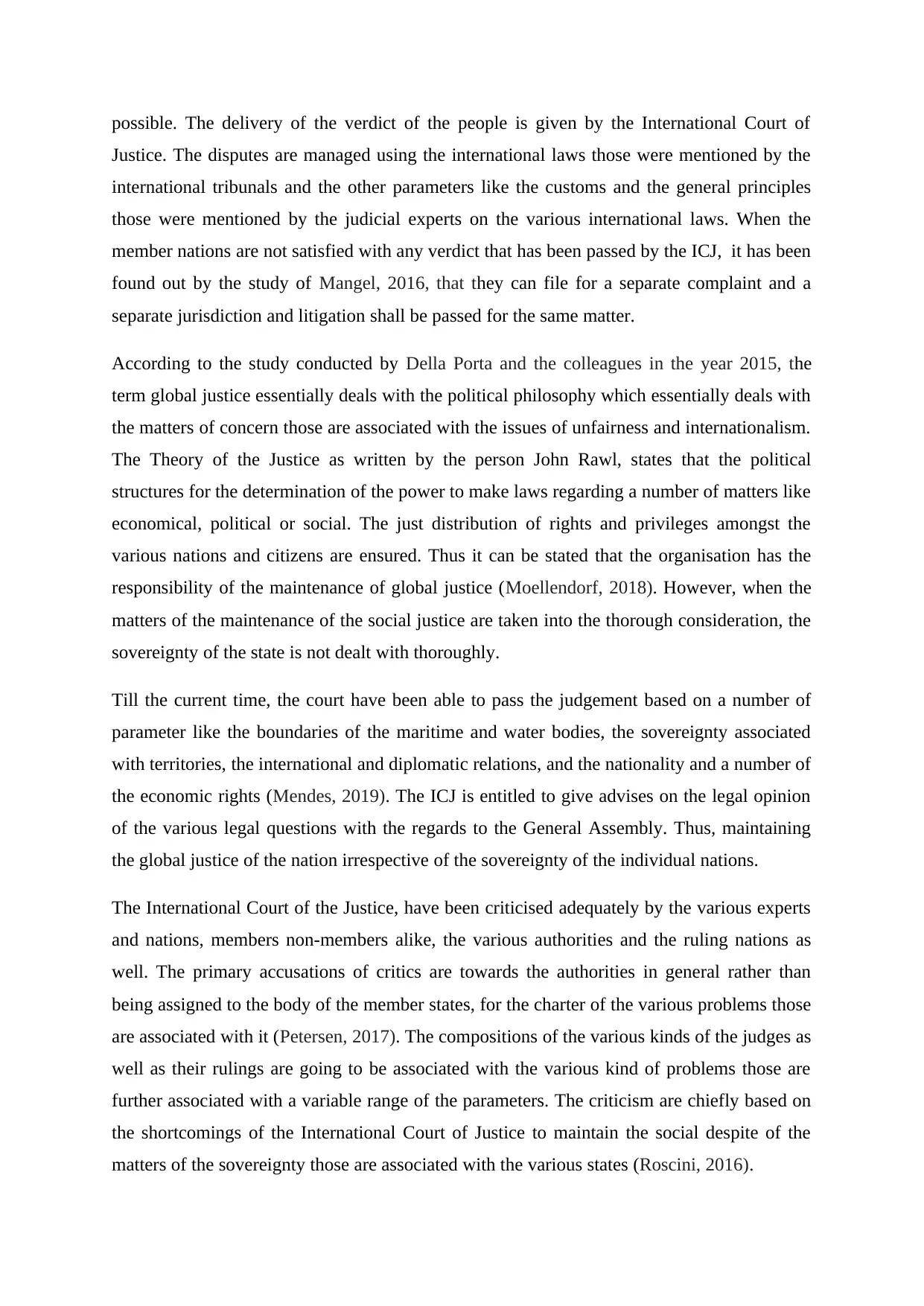
possible. The delivery of the verdict of the people is given by the International Court of
Justice. The disputes are managed using the international laws those were mentioned by the
international tribunals and the other parameters like the customs and the general principles
those were mentioned by the judicial experts on the various international laws. When the
member nations are not satisfied with any verdict that has been passed by the ICJ, it has been
found out by the study of Mangel, 2016, that they can file for a separate complaint and a
separate jurisdiction and litigation shall be passed for the same matter.
According to the study conducted by Della Porta and the colleagues in the year 2015, the
term global justice essentially deals with the political philosophy which essentially deals with
the matters of concern those are associated with the issues of unfairness and internationalism.
The Theory of the Justice as written by the person John Rawl, states that the political
structures for the determination of the power to make laws regarding a number of matters like
economical, political or social. The just distribution of rights and privileges amongst the
various nations and citizens are ensured. Thus it can be stated that the organisation has the
responsibility of the maintenance of global justice (Moellendorf, 2018). However, when the
matters of the maintenance of the social justice are taken into the thorough consideration, the
sovereignty of the state is not dealt with thoroughly.
Till the current time, the court have been able to pass the judgement based on a number of
parameter like the boundaries of the maritime and water bodies, the sovereignty associated
with territories, the international and diplomatic relations, and the nationality and a number of
the economic rights (Mendes, 2019). The ICJ is entitled to give advises on the legal opinion
of the various legal questions with the regards to the General Assembly. Thus, maintaining
the global justice of the nation irrespective of the sovereignty of the individual nations.
The International Court of the Justice, have been criticised adequately by the various experts
and nations, members non-members alike, the various authorities and the ruling nations as
well. The primary accusations of critics are towards the authorities in general rather than
being assigned to the body of the member states, for the charter of the various problems those
are associated with it (Petersen, 2017). The compositions of the various kinds of the judges as
well as their rulings are going to be associated with the various kind of problems those are
further associated with a variable range of the parameters. The criticism are chiefly based on
the shortcomings of the International Court of Justice to maintain the social despite of the
matters of the sovereignty those are associated with the various states (Roscini, 2016).
Justice. The disputes are managed using the international laws those were mentioned by the
international tribunals and the other parameters like the customs and the general principles
those were mentioned by the judicial experts on the various international laws. When the
member nations are not satisfied with any verdict that has been passed by the ICJ, it has been
found out by the study of Mangel, 2016, that they can file for a separate complaint and a
separate jurisdiction and litigation shall be passed for the same matter.
According to the study conducted by Della Porta and the colleagues in the year 2015, the
term global justice essentially deals with the political philosophy which essentially deals with
the matters of concern those are associated with the issues of unfairness and internationalism.
The Theory of the Justice as written by the person John Rawl, states that the political
structures for the determination of the power to make laws regarding a number of matters like
economical, political or social. The just distribution of rights and privileges amongst the
various nations and citizens are ensured. Thus it can be stated that the organisation has the
responsibility of the maintenance of global justice (Moellendorf, 2018). However, when the
matters of the maintenance of the social justice are taken into the thorough consideration, the
sovereignty of the state is not dealt with thoroughly.
Till the current time, the court have been able to pass the judgement based on a number of
parameter like the boundaries of the maritime and water bodies, the sovereignty associated
with territories, the international and diplomatic relations, and the nationality and a number of
the economic rights (Mendes, 2019). The ICJ is entitled to give advises on the legal opinion
of the various legal questions with the regards to the General Assembly. Thus, maintaining
the global justice of the nation irrespective of the sovereignty of the individual nations.
The International Court of the Justice, have been criticised adequately by the various experts
and nations, members non-members alike, the various authorities and the ruling nations as
well. The primary accusations of critics are towards the authorities in general rather than
being assigned to the body of the member states, for the charter of the various problems those
are associated with it (Petersen, 2017). The compositions of the various kinds of the judges as
well as their rulings are going to be associated with the various kind of problems those are
further associated with a variable range of the parameters. The criticism are chiefly based on
the shortcomings of the International Court of Justice to maintain the social despite of the
matters of the sovereignty those are associated with the various states (Roscini, 2016).
Secure Best Marks with AI Grader
Need help grading? Try our AI Grader for instant feedback on your assignments.

As per the study of Treves in the year 2017, it can be found out that the compulsory
jurisdiction of the company is not compulsory but associated with the consensual agreement
of all the parties under concern. The various states have the opinion with respect they can
either accept or reject the terms and the conditions of the judgement those have been passes
by the courts. Thus when the consent has been given by the state, and the various disputes
those have been given by the court have been granted consent after being submitted, the state
thus might be subjected to the various judgements of the court under concern (Alter et al,
2016). Hence, the correct word to be defining the compulsion, or the judgement passed by the
ICJ is the legal obligation and not just compulsion.
Thus the compulsory jurisdiction shall be limited to the aggression those are associated with
the automatic escalation of the Security Council. According to the principle of the
sovereignty it can be deemed that no nations, are neither inferior nor superior to the other.
Hence the obligation when the legal matters are concerned cannot be forced upon the others
owing to a number of factors (Bork, 2018). No legal nation, irrespective of their standards as
per the economic or the social status in the world has the sovereign rights of forcing the other
nation to follow a certain constraint. In spite of the violation of the various laws as per the
tribunals of the internal laws and the various other matters the nations cannot force the states
to practice certain legality with respect to the international laws. Thus there exists no
necessary force which would ascertain the country to follow the writs and the jurisdiction of
the nations. When the matters of the jurisdictions associated with the national boundaries,
natural resources and the disputes associated between the two nations with regards to it, are
considered, as per the study of Hillebrecht, 2019, the sovereignty of the nation as well as the
other potential threats to the diminishing of the worth of the ICJ’s judiciary power comes into
play.
Thus the critics have criticised the power and the capability of the ICJ and the variation in the
terms of social justice and sovereignty. The matter of the international justice is associated
with not the power of the state but the consent of the state to properly give consent to the
decisions those have been made in the jurisdictions those matter. Thus the matter of the
compulsory jurisdiction of global justice happens to be a big blow to the proper maintenance
of the sovereignty of the nations all around the globe.
The various organisations, the enterprises all around the world, the individuals who have
been at the receiving end of the mishappenings of the rulings of the international court of
jurisdiction of the company is not compulsory but associated with the consensual agreement
of all the parties under concern. The various states have the opinion with respect they can
either accept or reject the terms and the conditions of the judgement those have been passes
by the courts. Thus when the consent has been given by the state, and the various disputes
those have been given by the court have been granted consent after being submitted, the state
thus might be subjected to the various judgements of the court under concern (Alter et al,
2016). Hence, the correct word to be defining the compulsion, or the judgement passed by the
ICJ is the legal obligation and not just compulsion.
Thus the compulsory jurisdiction shall be limited to the aggression those are associated with
the automatic escalation of the Security Council. According to the principle of the
sovereignty it can be deemed that no nations, are neither inferior nor superior to the other.
Hence the obligation when the legal matters are concerned cannot be forced upon the others
owing to a number of factors (Bork, 2018). No legal nation, irrespective of their standards as
per the economic or the social status in the world has the sovereign rights of forcing the other
nation to follow a certain constraint. In spite of the violation of the various laws as per the
tribunals of the internal laws and the various other matters the nations cannot force the states
to practice certain legality with respect to the international laws. Thus there exists no
necessary force which would ascertain the country to follow the writs and the jurisdiction of
the nations. When the matters of the jurisdictions associated with the national boundaries,
natural resources and the disputes associated between the two nations with regards to it, are
considered, as per the study of Hillebrecht, 2019, the sovereignty of the nation as well as the
other potential threats to the diminishing of the worth of the ICJ’s judiciary power comes into
play.
Thus the critics have criticised the power and the capability of the ICJ and the variation in the
terms of social justice and sovereignty. The matter of the international justice is associated
with not the power of the state but the consent of the state to properly give consent to the
decisions those have been made in the jurisdictions those matter. Thus the matter of the
compulsory jurisdiction of global justice happens to be a big blow to the proper maintenance
of the sovereignty of the nations all around the globe.
The various organisations, the enterprises all around the world, the individuals who have
been at the receiving end of the mishappenings of the rulings of the international court of
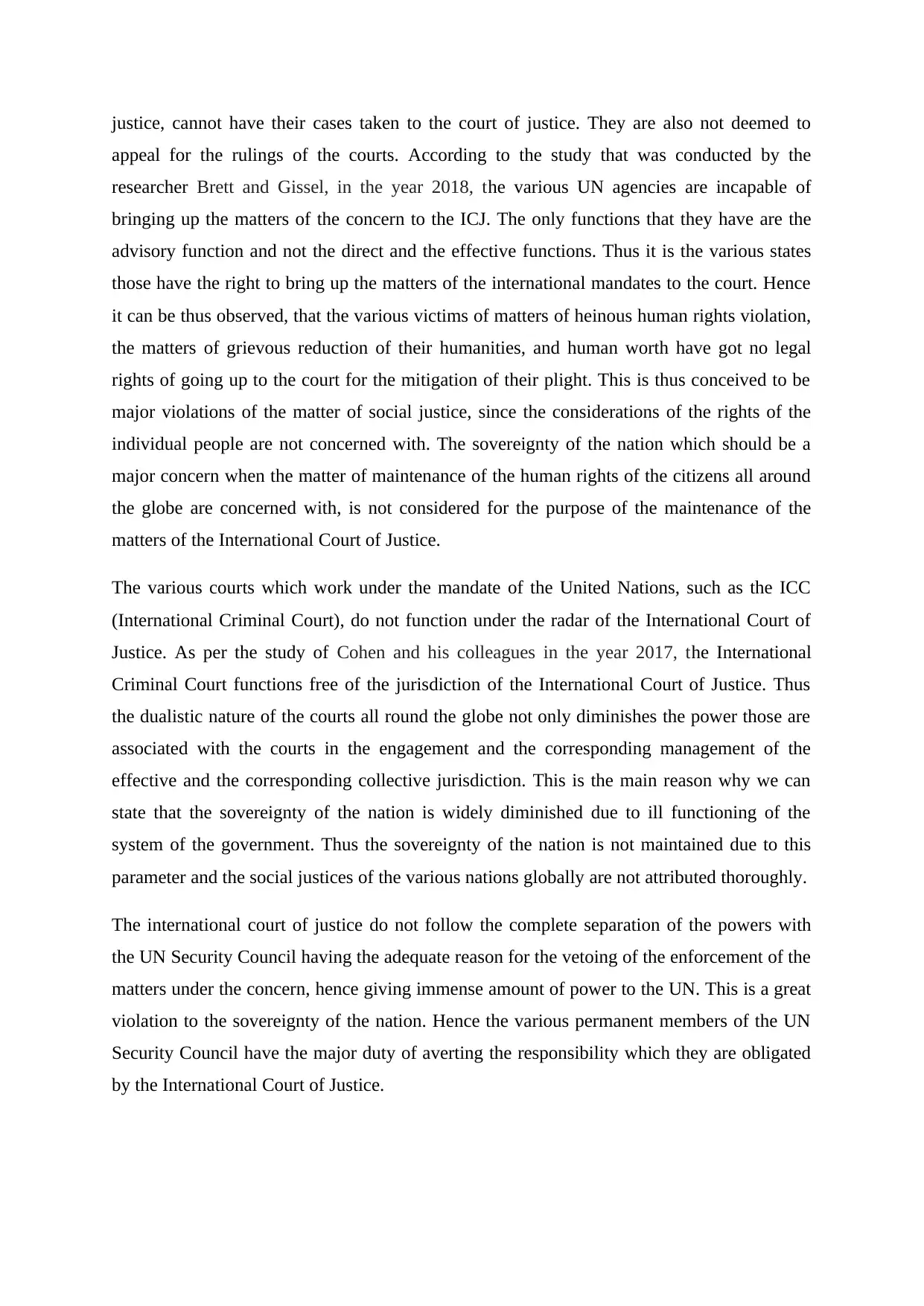
justice, cannot have their cases taken to the court of justice. They are also not deemed to
appeal for the rulings of the courts. According to the study that was conducted by the
researcher Brett and Gissel, in the year 2018, the various UN agencies are incapable of
bringing up the matters of the concern to the ICJ. The only functions that they have are the
advisory function and not the direct and the effective functions. Thus it is the various states
those have the right to bring up the matters of the international mandates to the court. Hence
it can be thus observed, that the various victims of matters of heinous human rights violation,
the matters of grievous reduction of their humanities, and human worth have got no legal
rights of going up to the court for the mitigation of their plight. This is thus conceived to be
major violations of the matter of social justice, since the considerations of the rights of the
individual people are not concerned with. The sovereignty of the nation which should be a
major concern when the matter of maintenance of the human rights of the citizens all around
the globe are concerned with, is not considered for the purpose of the maintenance of the
matters of the International Court of Justice.
The various courts which work under the mandate of the United Nations, such as the ICC
(International Criminal Court), do not function under the radar of the International Court of
Justice. As per the study of Cohen and his colleagues in the year 2017, the International
Criminal Court functions free of the jurisdiction of the International Court of Justice. Thus
the dualistic nature of the courts all round the globe not only diminishes the power those are
associated with the courts in the engagement and the corresponding management of the
effective and the corresponding collective jurisdiction. This is the main reason why we can
state that the sovereignty of the nation is widely diminished due to ill functioning of the
system of the government. Thus the sovereignty of the nation is not maintained due to this
parameter and the social justices of the various nations globally are not attributed thoroughly.
The international court of justice do not follow the complete separation of the powers with
the UN Security Council having the adequate reason for the vetoing of the enforcement of the
matters under the concern, hence giving immense amount of power to the UN. This is a great
violation to the sovereignty of the nation. Hence the various permanent members of the UN
Security Council have the major duty of averting the responsibility which they are obligated
by the International Court of Justice.
appeal for the rulings of the courts. According to the study that was conducted by the
researcher Brett and Gissel, in the year 2018, the various UN agencies are incapable of
bringing up the matters of the concern to the ICJ. The only functions that they have are the
advisory function and not the direct and the effective functions. Thus it is the various states
those have the right to bring up the matters of the international mandates to the court. Hence
it can be thus observed, that the various victims of matters of heinous human rights violation,
the matters of grievous reduction of their humanities, and human worth have got no legal
rights of going up to the court for the mitigation of their plight. This is thus conceived to be
major violations of the matter of social justice, since the considerations of the rights of the
individual people are not concerned with. The sovereignty of the nation which should be a
major concern when the matter of maintenance of the human rights of the citizens all around
the globe are concerned with, is not considered for the purpose of the maintenance of the
matters of the International Court of Justice.
The various courts which work under the mandate of the United Nations, such as the ICC
(International Criminal Court), do not function under the radar of the International Court of
Justice. As per the study of Cohen and his colleagues in the year 2017, the International
Criminal Court functions free of the jurisdiction of the International Court of Justice. Thus
the dualistic nature of the courts all round the globe not only diminishes the power those are
associated with the courts in the engagement and the corresponding management of the
effective and the corresponding collective jurisdiction. This is the main reason why we can
state that the sovereignty of the nation is widely diminished due to ill functioning of the
system of the government. Thus the sovereignty of the nation is not maintained due to this
parameter and the social justices of the various nations globally are not attributed thoroughly.
The international court of justice do not follow the complete separation of the powers with
the UN Security Council having the adequate reason for the vetoing of the enforcement of the
matters under the concern, hence giving immense amount of power to the UN. This is a great
violation to the sovereignty of the nation. Hence the various permanent members of the UN
Security Council have the major duty of averting the responsibility which they are obligated
by the International Court of Justice.
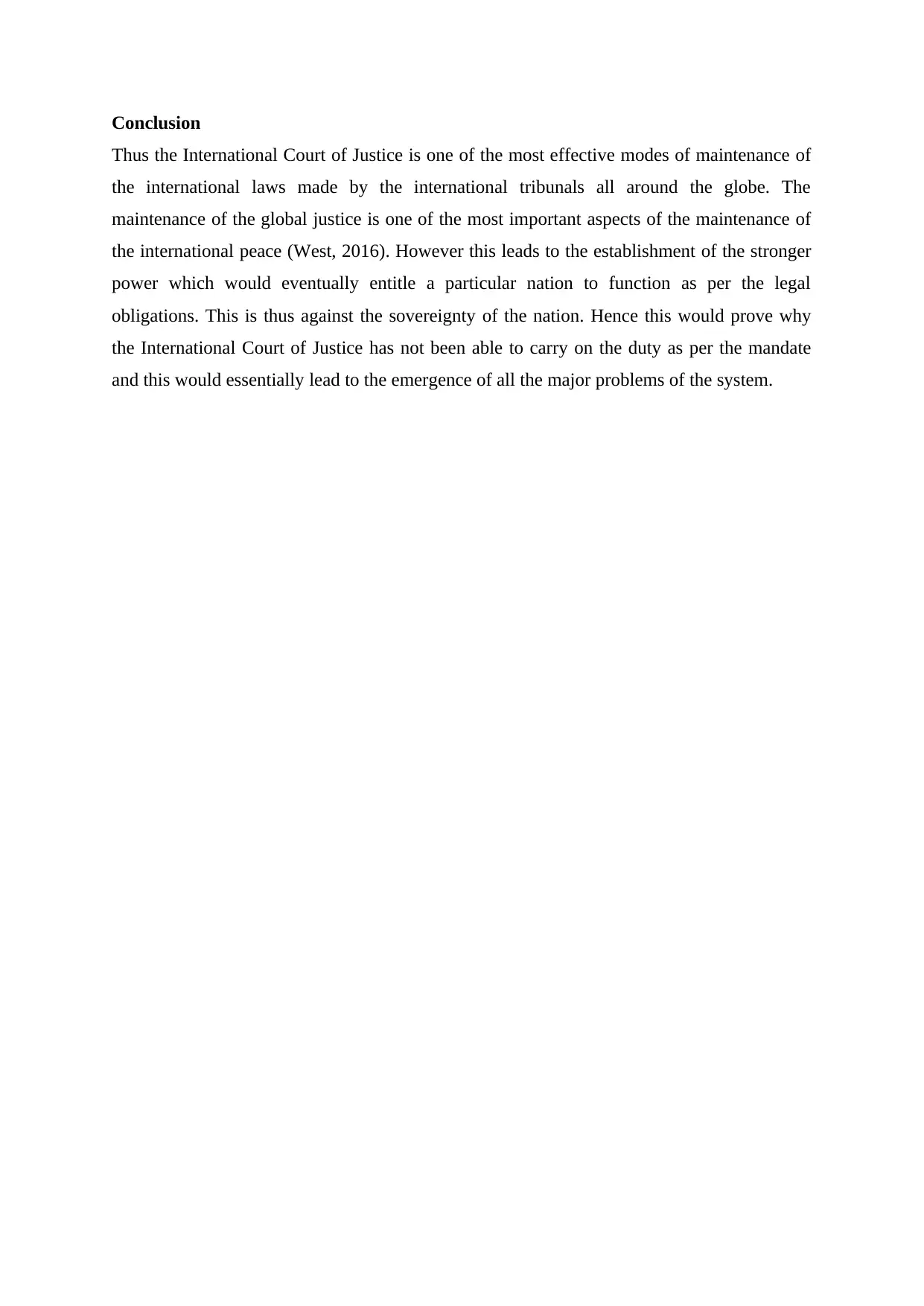
Conclusion
Thus the International Court of Justice is one of the most effective modes of maintenance of
the international laws made by the international tribunals all around the globe. The
maintenance of the global justice is one of the most important aspects of the maintenance of
the international peace (West, 2016). However this leads to the establishment of the stronger
power which would eventually entitle a particular nation to function as per the legal
obligations. This is thus against the sovereignty of the nation. Hence this would prove why
the International Court of Justice has not been able to carry on the duty as per the mandate
and this would essentially lead to the emergence of all the major problems of the system.
Thus the International Court of Justice is one of the most effective modes of maintenance of
the international laws made by the international tribunals all around the globe. The
maintenance of the global justice is one of the most important aspects of the maintenance of
the international peace (West, 2016). However this leads to the establishment of the stronger
power which would eventually entitle a particular nation to function as per the legal
obligations. This is thus against the sovereignty of the nation. Hence this would prove why
the International Court of Justice has not been able to carry on the duty as per the mandate
and this would essentially lead to the emergence of all the major problems of the system.
Paraphrase This Document
Need a fresh take? Get an instant paraphrase of this document with our AI Paraphraser
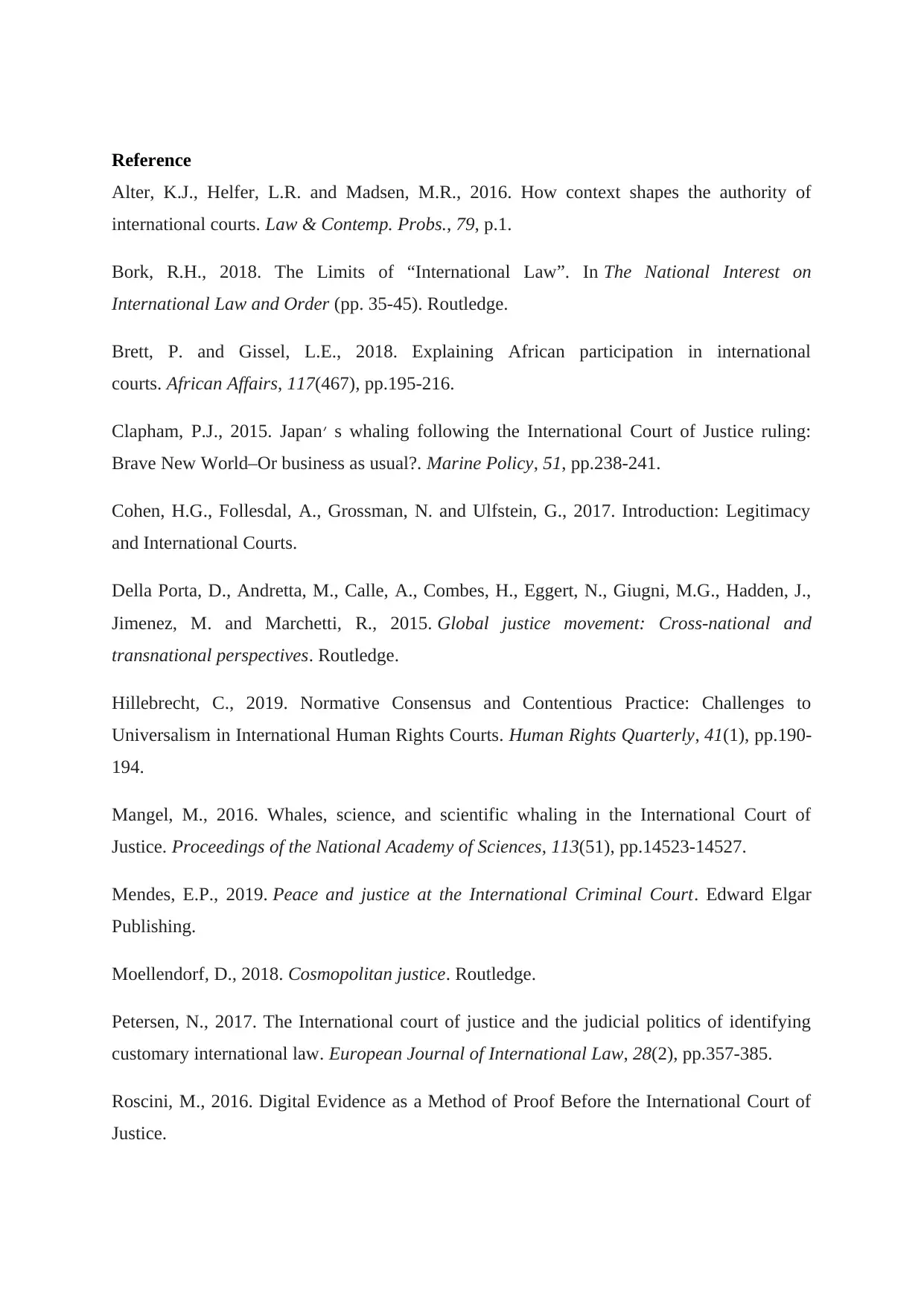
Reference
Alter, K.J., Helfer, L.R. and Madsen, M.R., 2016. How context shapes the authority of
international courts. Law & Contemp. Probs., 79, p.1.
Bork, R.H., 2018. The Limits of “International Law”. In The National Interest on
International Law and Order (pp. 35-45). Routledge.
Brett, P. and Gissel, L.E., 2018. Explaining African participation in international
courts. African Affairs, 117(467), pp.195-216.
Clapham, P.J., 2015. Japan׳ s whaling following the International Court of Justice ruling:
Brave New World–Or business as usual?. Marine Policy, 51, pp.238-241.
Cohen, H.G., Follesdal, A., Grossman, N. and Ulfstein, G., 2017. Introduction: Legitimacy
and International Courts.
Della Porta, D., Andretta, M., Calle, A., Combes, H., Eggert, N., Giugni, M.G., Hadden, J.,
Jimenez, M. and Marchetti, R., 2015. Global justice movement: Cross-national and
transnational perspectives. Routledge.
Hillebrecht, C., 2019. Normative Consensus and Contentious Practice: Challenges to
Universalism in International Human Rights Courts. Human Rights Quarterly, 41(1), pp.190-
194.
Mangel, M., 2016. Whales, science, and scientific whaling in the International Court of
Justice. Proceedings of the National Academy of Sciences, 113(51), pp.14523-14527.
Mendes, E.P., 2019. Peace and justice at the International Criminal Court. Edward Elgar
Publishing.
Moellendorf, D., 2018. Cosmopolitan justice. Routledge.
Petersen, N., 2017. The International court of justice and the judicial politics of identifying
customary international law. European Journal of International Law, 28(2), pp.357-385.
Roscini, M., 2016. Digital Evidence as a Method of Proof Before the International Court of
Justice.
Alter, K.J., Helfer, L.R. and Madsen, M.R., 2016. How context shapes the authority of
international courts. Law & Contemp. Probs., 79, p.1.
Bork, R.H., 2018. The Limits of “International Law”. In The National Interest on
International Law and Order (pp. 35-45). Routledge.
Brett, P. and Gissel, L.E., 2018. Explaining African participation in international
courts. African Affairs, 117(467), pp.195-216.
Clapham, P.J., 2015. Japan׳ s whaling following the International Court of Justice ruling:
Brave New World–Or business as usual?. Marine Policy, 51, pp.238-241.
Cohen, H.G., Follesdal, A., Grossman, N. and Ulfstein, G., 2017. Introduction: Legitimacy
and International Courts.
Della Porta, D., Andretta, M., Calle, A., Combes, H., Eggert, N., Giugni, M.G., Hadden, J.,
Jimenez, M. and Marchetti, R., 2015. Global justice movement: Cross-national and
transnational perspectives. Routledge.
Hillebrecht, C., 2019. Normative Consensus and Contentious Practice: Challenges to
Universalism in International Human Rights Courts. Human Rights Quarterly, 41(1), pp.190-
194.
Mangel, M., 2016. Whales, science, and scientific whaling in the International Court of
Justice. Proceedings of the National Academy of Sciences, 113(51), pp.14523-14527.
Mendes, E.P., 2019. Peace and justice at the International Criminal Court. Edward Elgar
Publishing.
Moellendorf, D., 2018. Cosmopolitan justice. Routledge.
Petersen, N., 2017. The International court of justice and the judicial politics of identifying
customary international law. European Journal of International Law, 28(2), pp.357-385.
Roscini, M., 2016. Digital Evidence as a Method of Proof Before the International Court of
Justice.
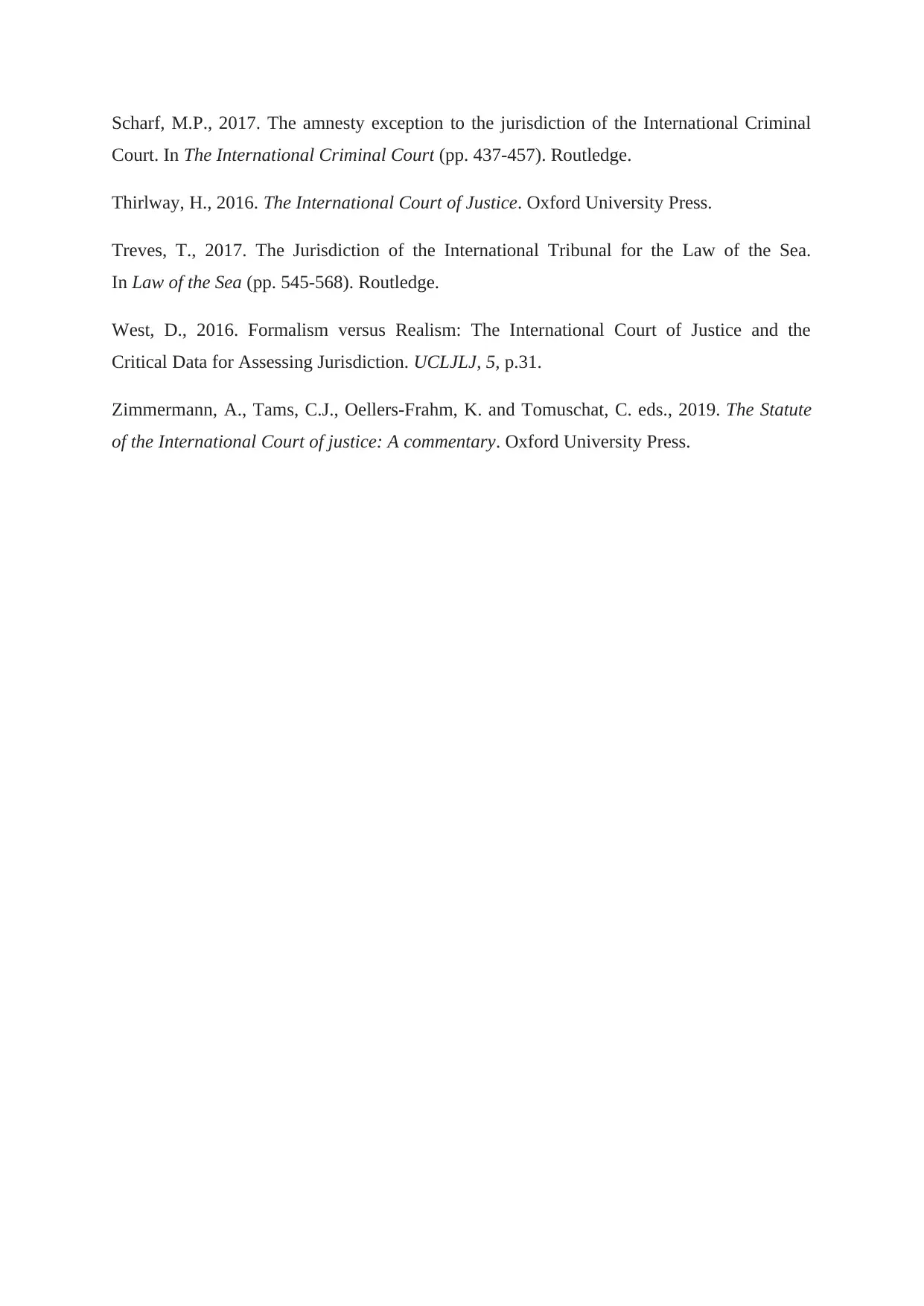
Scharf, M.P., 2017. The amnesty exception to the jurisdiction of the International Criminal
Court. In The International Criminal Court (pp. 437-457). Routledge.
Thirlway, H., 2016. The International Court of Justice. Oxford University Press.
Treves, T., 2017. The Jurisdiction of the International Tribunal for the Law of the Sea.
In Law of the Sea (pp. 545-568). Routledge.
West, D., 2016. Formalism versus Realism: The International Court of Justice and the
Critical Data for Assessing Jurisdiction. UCLJLJ, 5, p.31.
Zimmermann, A., Tams, C.J., Oellers-Frahm, K. and Tomuschat, C. eds., 2019. The Statute
of the International Court of justice: A commentary. Oxford University Press.
Court. In The International Criminal Court (pp. 437-457). Routledge.
Thirlway, H., 2016. The International Court of Justice. Oxford University Press.
Treves, T., 2017. The Jurisdiction of the International Tribunal for the Law of the Sea.
In Law of the Sea (pp. 545-568). Routledge.
West, D., 2016. Formalism versus Realism: The International Court of Justice and the
Critical Data for Assessing Jurisdiction. UCLJLJ, 5, p.31.
Zimmermann, A., Tams, C.J., Oellers-Frahm, K. and Tomuschat, C. eds., 2019. The Statute
of the International Court of justice: A commentary. Oxford University Press.
1 out of 9
Related Documents
Your All-in-One AI-Powered Toolkit for Academic Success.
+13062052269
info@desklib.com
Available 24*7 on WhatsApp / Email
![[object Object]](/_next/static/media/star-bottom.7253800d.svg)
Unlock your academic potential
© 2024 | Zucol Services PVT LTD | All rights reserved.





